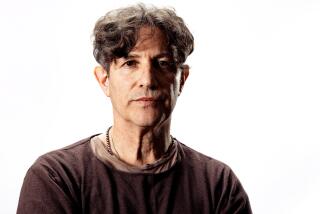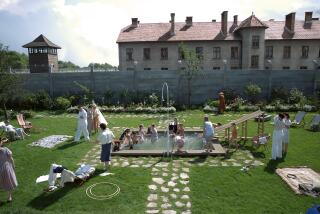A War of Indecision : A minimalist style that belies ‘impoverished solitude’ : NIGHT DEPARTURE and NO PLACE, <i> By Emmanuel Bove</i> . <i> Translated by Carol Volk (Four Walls Eight Windows: $25; 468 pp.)</i>
- Share via
“Emmanuel Bove; more than anyone else, he has an instinct for the essential detail.” Ample praise for any writer, to be lauded for special attention to the realm where God is. But this encomium was given by the parsimonious Samuel Beckett, from whom 14 words of approbation are an immense (yet trustworthy) effusion.
Bove is almost entirely unknown in this country, though his first two books, “My Friends” and “Armand,” were marginally distributed here under the imprint of a British publisher. After the original French publication of “My Friends” in 1922 Bove found himself, at 24, a minor celebrity in the scintillant Parisian avant-garde. Championed by Colette, he proclaimed himself the inventor of a new literary genre, “the novel of impoverished solitude.”
That youthful self-promotion was misplaced understatement. Impoverished solitude bears the down-at-the-heels shoe prints of many writers (and certainly Beckett is among the most distinctive of them). Bove has captured something more particular: a refined persona perpetually at war with its own indecision and that of others. His hyper-aware narrators second- and third-guess themselves in every situation from the mundane to the extreme until they can no longer tell the difference, and so disappear beneath the world’s implacable insistence on a final conformity, even in wartime, when all other rules are suspended.
A passage from “My Friends” gives a flavor of Bove’s early, minimalist style of ironic acquiescence: “An empty tram arrived. It had been washed during the night. The lamps which lit it seemed sad like the light one has forgotten to put out before going to sleep.
“I sat down in a corner. The heaters were still cold. A draught making its way under a seat chilled my hands. The conductress, motionless in the centre of the tram, was yawning.
“ ‘La Motte-Piquet!’ she called.
“She would have called out just the same even if the tram had been empty.”
Here Bove conveys the oblivious and habitual nature of most human communication and underlines the vacuity that threatens everyone. His precise concatenation of minute observations, at times sensory, at times emotional, adds up to a humble truth: Even if it finds a home nowhere else, there’s room for consciousness in language.
Bove’s last two books, “Night Departure” and “No Place,” appeared after his early death in 1945. He had refused publication in occupied France, so the earlier book came out in Algeria. “Night Departure,” dedicated to Gen. De Gaulle, details the narrator’s imprisonment in and escape from a Nazi POW camp; “No Place” continues the story with his fruitless search for a secure haven in occupied France. This brief description, however, belies the real nature and strength of Bove’s narratives, which, far from “impoverished solitude,” are buffeted along by the enforced encounters and alliances of wartime.
There’s tension enough in these two final works, but it comes only rarely through the traditional agon of action. Indeed, he’s the Louis Armstrong of indecision, playing out its supple changes and smooth variations with masterful swing.
There’s comedy, too, as the narrator over and over discovers that “what one person can do alone becomes impossible with a group” and yet finds it impossible to act on his own behalf. Instead, he aligns his own incapacities with the unpredictable paranoias and allegiances, the stubborn selfishness and thoughtless generosity of his fellow escapees (and, back in France, his relatives and former friends).
At times the narrator’s detailed analyses of the feckless machinations of his companions has a ludicrous elegance: “Durutte, who along with Bisson had tried to prevent me from leaving the barracks, approached me. It was clear he regretted his behavior. He explained that he hadn’t been all that angry with me, but that, worried about the turn of events and convinced the Germans would ultimately win (there were many who, like Durutte, always thought the Germans would win), he’d obeyed Pelet without realizing what he was doing. He asked for my forgiveness. I saw he was sincere, that he was one of those people who act against their wishes in life, and who, realizing their weakness is leading them astray, naively say that they did it despite themselves; since they have no ambition they’re not worried this honesty might harm them later on. A simple, honest fellow, in short.” The comedy lies not only in the fact that in a prison camp such psychological acuity is rather useless and arbitrarily applied but also in that the narrator’s observations might be made equally about himself. Such is the relativistic world of Bove.
But Bove never experienced anything close to the events these narratives relate; ill health apparently kept him out of service in both world wars. Nonetheless he has managed to use the outsider status of the prisoner of war and the escapee in occupied territory to explore universal human truths about our perpetual need for social reinforcement as well as our inability, finally, to truly belong to any group.
This work has great emotional relevance in our age of fragmented masses--as does Kafka’s, though Bove’s is less abstract. The essential relativism of the Bovean dilemma is summed up in his response to a critic who accused him of pessimism: “A pessimist is someone who lives with optimists.”
More to Read
Sign up for our Book Club newsletter
Get the latest news, events and more from the Los Angeles Times Book Club, and help us get L.A. reading and talking.
You may occasionally receive promotional content from the Los Angeles Times.








